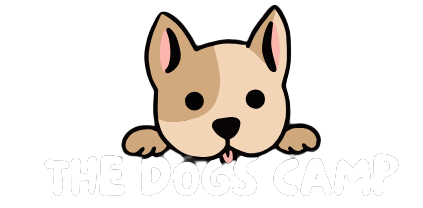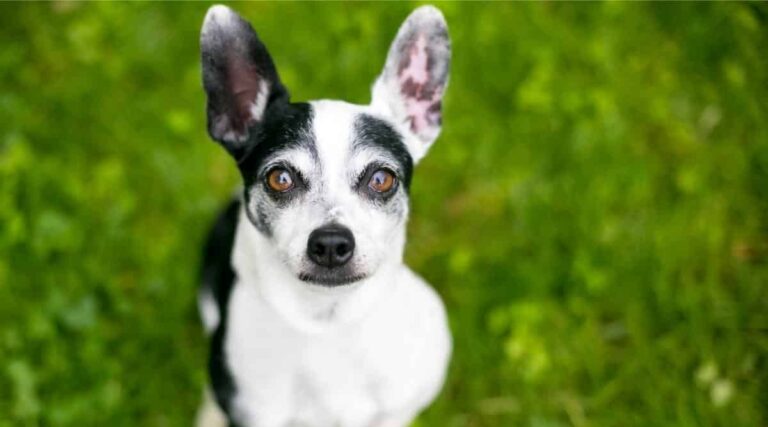Corgi Chihuahua Mix: Everything You Need to Know About the Chigi Dog Breed Information
The Chigi is a unique mix of two beloved dogs: the tiny, energetic Chihuahua and the sturdy, friendly Corgi. This small and robust crossbreed makes it an excellent pet for different homes and ways of living.
Owners should think about the varied traits the Chigi may have, which can lean more towards one parent breed. They are a perfect example of genetic variety in dogs.
Any owner’s health, care, and diet are key areas to understand. Knowing what makes a Chigi special requires more than just a glance at their cuteness. It’s about understanding their needs and how they fit into a family.
Key Takeaways
- Chigi dogs blend Chihuahua energy with Corgi friendliness.
- Expect a range of traits reflecting either parent breed.
- Understanding their health and care is crucial for owners.
Quick Facts
The Chigi is a charming mixed breed, born from the combination of a Chihuahua and a Pembroke Welsh Corgi. Known for its small size, sharp mind, and unwavering loyalty, this breed fits well in the small to medium dog category. It blends the Corgi’s instinct for herding with the Chihuahua’s confident attitude.
Caring for a Chigi’s coat is pretty straightforward, involving regular brushing to control shedding and baths as needed for cleanliness. While Chigis often enjoy a healthy mix of traits, living typically between 12 to 14 years, owners must be aware of possible inherited health conditions like patellar luxation and hip dysplasia. Timely and attentive care from a vet is vital to keeping this lovable and flexible friend in good shape.
Chigi Dog Breed Pictures
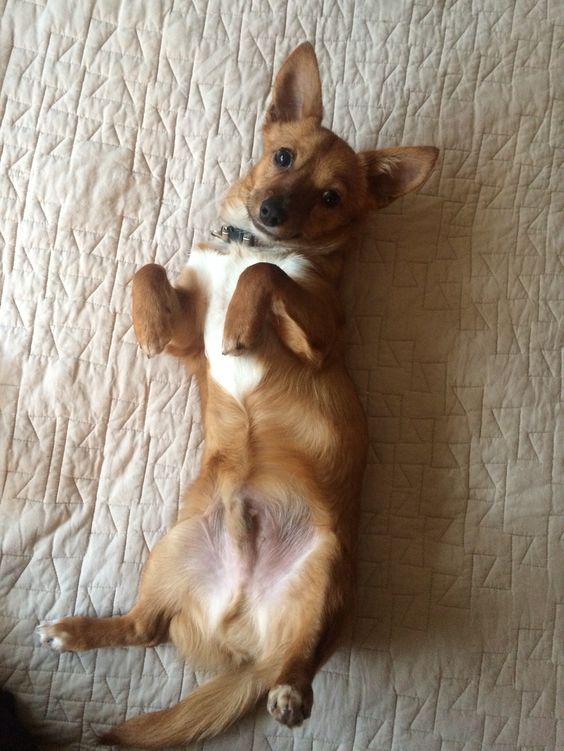
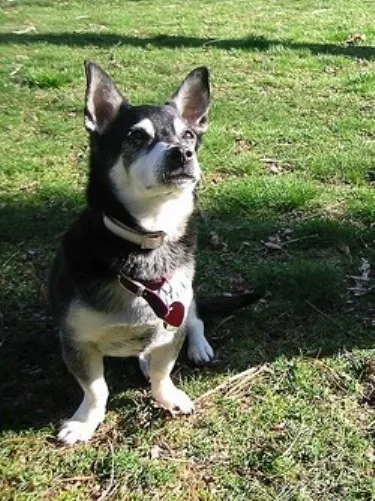
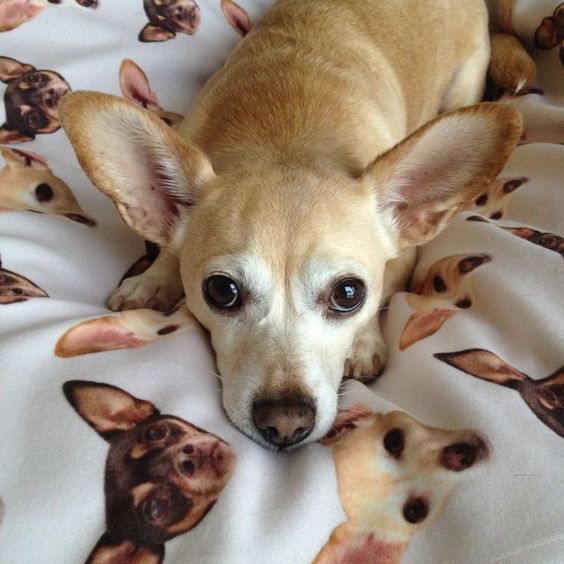
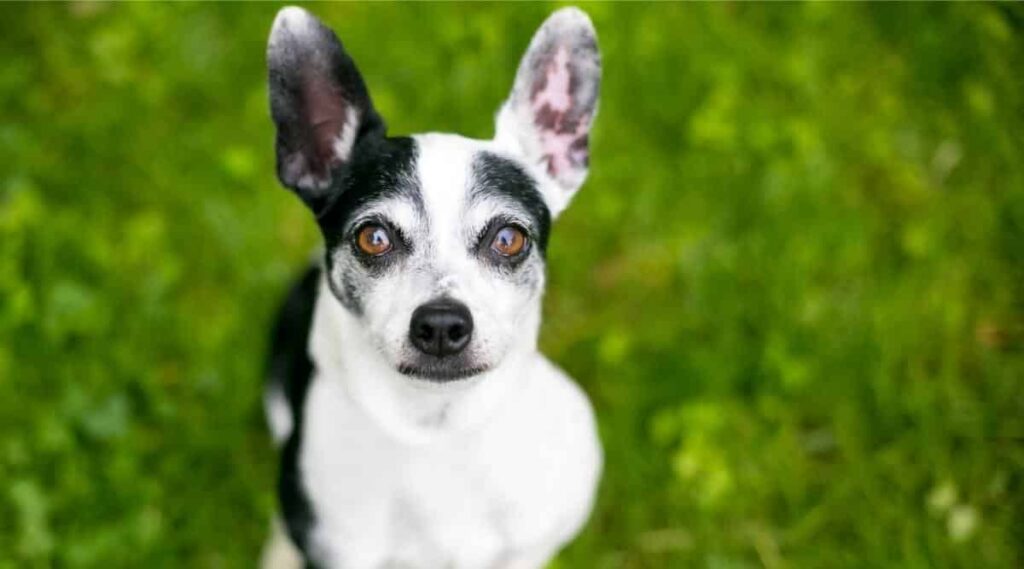
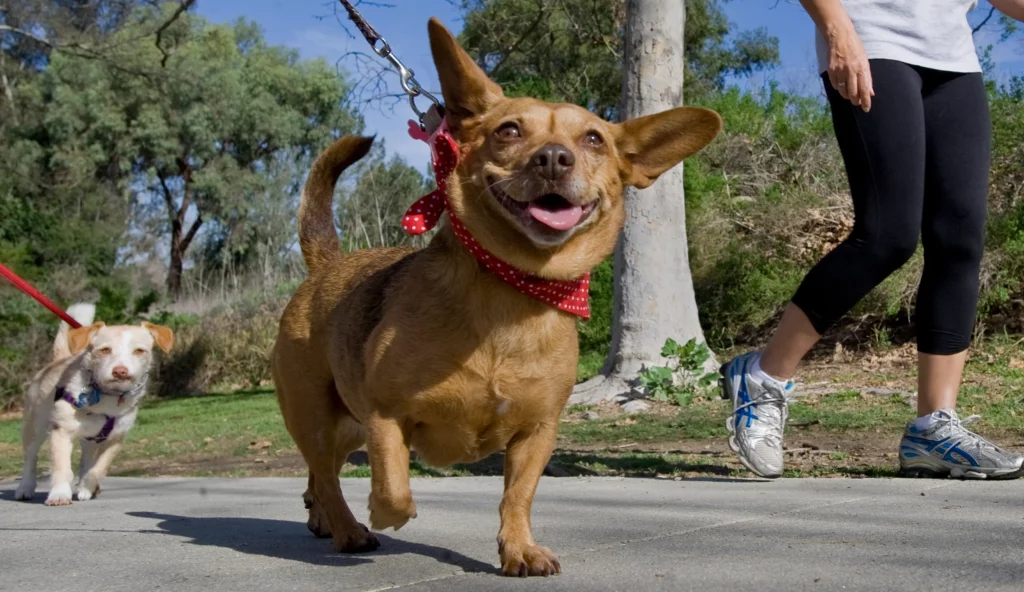
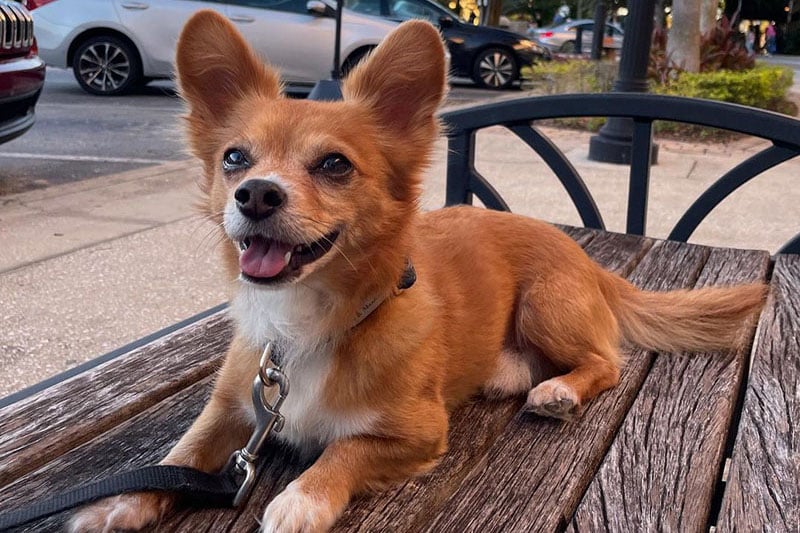
Overview
Building on the foundational aspects of the Chigi’s lineage and care requirements, this overview aims to encapsulate the breed’s overall suitability for various living environments, highlighting its adaptability and the factors influencing its integration into family settings.
The Chigi, a Corgi Chihuahua Mix, is a mixed breed characterized by a small stature yet a robust personality drawn from its parent breeds. As small dogs, Chigis align well with apartment living, thanks to their propensity for quietness and manageable energy levels. Their ability to engage in indoor play and contentment with short, brisk walks makes them ideal for compact living spaces.
Prospective owners should assess the Chigi’s compatibility with other residents and pets, alongside their relatively low-maintenance grooming needs and friendly nature, which render them excellent family dogs.
Key Traits of Corgi Chihuahua Mix

Chigi dogs are known for their vigilant, loving, and lively nature, a combination of qualities they get from their Chihuahua and Corgi ancestors. These dogs are perfect pets for different types of families. Their compact size makes them ideal for apartment living, and they are generally peaceful and well-behaved indoors. Chigis may have tiny legs and a long body, but they still need regular exercise to stay healthy and avoid gaining weight, leading to back problems common in dogs with their body shape.
| Trait | Description |
|---|---|
| Size | Small, fits well in various homes |
| Physical Build | Short-legged, elongated body, risk of back issues |
| Coat | Blends Corgi and Chihuahua features, low maintenance, and affectionate |
| Exercise Needs | Must be active to remain fit |
| Health Concerns | Dental health is a priority and needs regular care |
Chigis are charming little dogs that thrive in many different living situations due to their small size. Their body structure, characterized by short legs and an elongated torso, can make them prone to back problems. The coat of a Chigi is a mix of its Corgi and Chihuahua heritage and doesn’t require extensive grooming. Chigi owners need to ensure these dogs get enough physical activity to prevent health issues like obesity. Dental health is also a concern for Chigis, so regular check-ups and maintenance are essential.
Parent Breed Information, Origins and Development
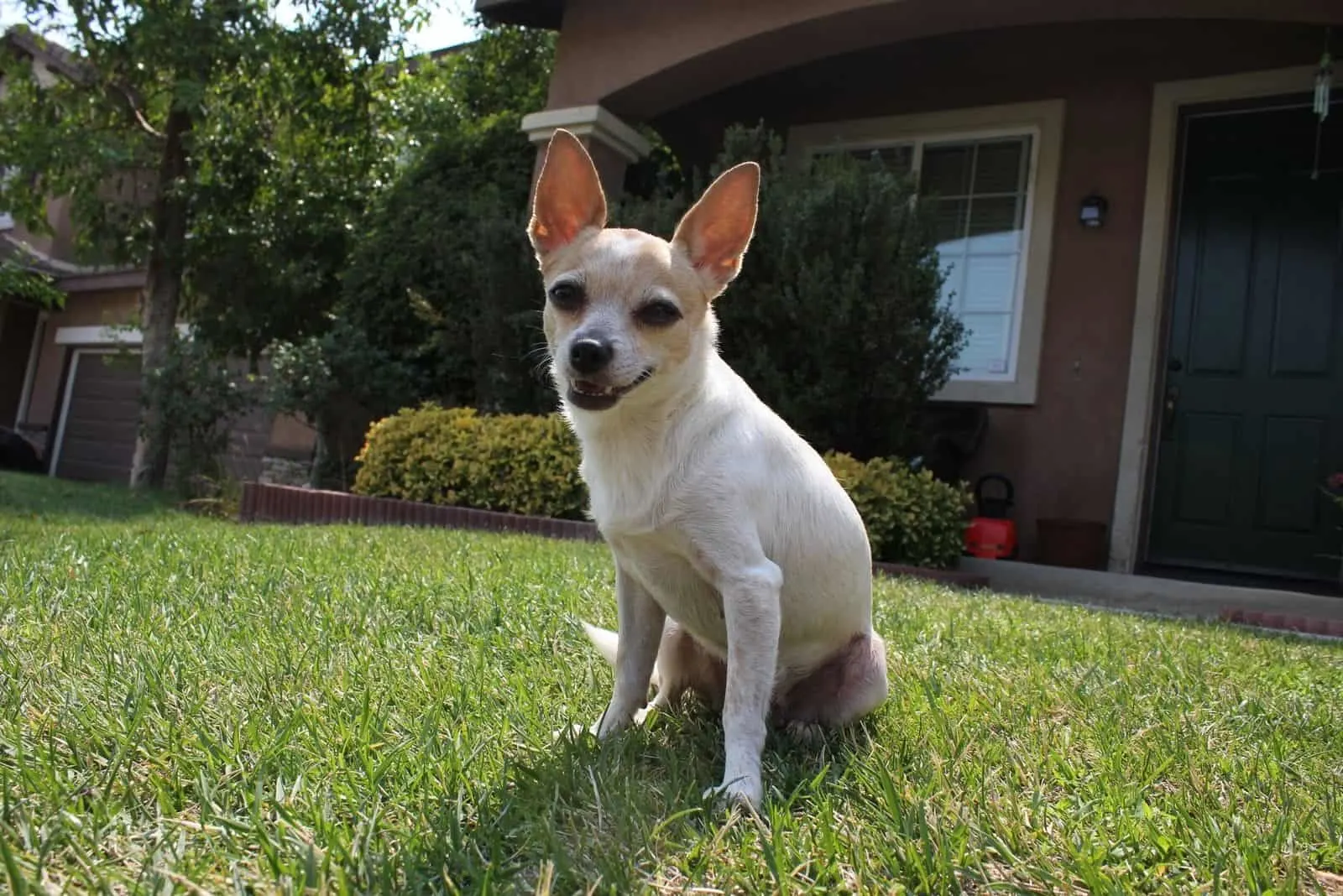
The Chigi is a designer dog bred from the Chihuahua and the Pembroke Welsh Corgi. Not officially recognized by major kennel clubs, the Chigi blends the small size and lively nature of the Chihuahua with the Corgi’s herding solid background. This mix exemplifies the modern trend of creating new dog types that combine preferred features of well-known breeds.
The Chihuahua has roots in ancient Mexican civilizations, giving the Chigi its tiny build and vigilant personality. The Pembroke Welsh Corgi, an influential herding breed, contributes strength and smartness to the Chigi mix. The crossbreeding may provide the Chigi with improved health and a longer life span than its purebred parents.
The rising demand for distinctive pets is mirrored in the Chigi’s increasing popularity. Owners are drawn to its unique blend of physical and behavioral qualities.
Chigi Breed Genesis
The Chigi is a unique dog breed that combines the courage of the Chihuahua with the friendly nature of the Corgi. This breed has become a favorite for those living in apartments or tiny homes.
The creation of the Chigi was sparked by breeders in the United States who wanted a dog that was both small and had the Chihuahua’s sharpness and the Corgi’s friendly demeanor. These dogs are known for being lovable, intelligent, and fun, making them perfect for families.
Chigis have coats that come in various colors and don’t require excessive grooming, which many owners appreciate. While the breed has ties to Central America, breeders have developed the Chigi to thrive in different homes worldwide.
This adaptability contributes to the breed’s ongoing appeal among dog lovers.
Historical Parentage
Understanding the Chigi’s heritage is vital to appreciating its charm and popularity. This dog breed mixes the Chihuahua and the Pembroke Welsh Corgi.
The tiny Chihuahua comes from a long history in Central America, with roots stretching back to the Maya and Aztec cultures.
The Corgi, on the other hand, has a more recent European background, dating back to the 19th century.
The Chigi was born when the two breeds were crossed, likely in the United States. This new breed inherited traits from both its ancestors.
Even though the American Kennel Club doesn’t officially recognize the Chigi, it’s become a favorite for many. People love it for its friendly nature and manageable size.
Evolution of Chigi
The Chigi is a hybrid dog that comes from combining the tiny and energetic Chihuahua with the robust and friendly Pembroke Welsh Corgi. They first appeared in the United States and quickly became popular in the designer dog trend. The Chihuahua’s presence in the mix can be attributed to Mexican immigrants who contributed this breed to the American canine mosaic. These immigrants paired their cherished Chihuahuas with the well-liked local breed, the Pembroke Welsh Corgi.
The Chigi is known for being alert and playful, traits it gets from the Chihuahua side. The Corgi brings its adaptability and friendly personality. These dogs fit well into different home settings and are easy to care for, which makes them a favorite among many. They are the perfect choice for people from all walks of life looking for a loyal pet.
Chigi Appearance
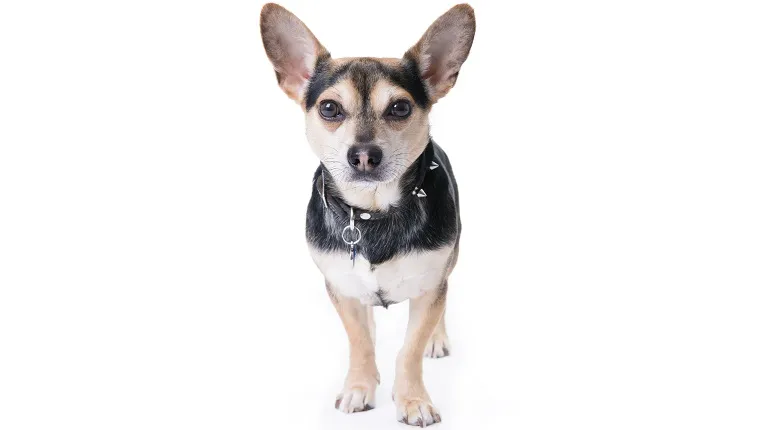
Understanding the size and shape of Chigi dogs is crucial for their health and living arrangements. These dogs combine Chihuahuas’s small stature with Corgis’s robust build. This mix influences how much living space they’ll need and their exercise requirements. Measuring them accurately and monitoring their growth is essential to ensure they get the proper care and diet.
Chigis typically weigh between 15 to 20 pounds. Owners should monitor their weight to prevent health issues related to obesity. They stand about 12 to 18 inches tall at the shoulder, which affects their ability to move and reach. Their bodies are shaped distinctively with short legs and a long body, a trait from their Corgi ancestors. Tracking their growth helps owners ensure the dogs hit their developmental markers and prepare for any changes needed as they reach full size.
Chigi Size Overview
When you look at a Chigi, you’ll see a dog on the smaller side, but not too tiny. These pups usually weigh between 15 and 30 pounds and stand about 7 to 12 inches tall at the shoulder. They’re a mix between a Chihuahua and a Corgi, and they’ve got the best of both worlds. They’re sturdy and well-built, thanks to their unique blend of breeds.
The Chigi has a distinctive look with short legs and a longer body, much like a Corgi. Their ears are pointy, often resembling those of a Chihuahua, and their fur can be tan, black, or brown. These dogs fit well in most homes because of their size.
To keep a Chigi healthy and happy, owners should pay close attention to their diet, grooming, and exercise.
Weight Range
Knowing the weight range of a Chigi is essential for their health. These dogs usually weigh between 15 and 30 pounds because they mix Corgi and Chihuahua breeds. Chigis are considered small to medium dogs, and managing their weight is crucial in keeping them healthy.
Regular check-ups with a veterinarian can help track their growth and ensure their diet and exercise are on point. Owners must monitor Chigi’s weight, as any significant changes could indicate health issues. A good diet and consistent fawn exercise are vital to keep a Chigi at a healthy weight.
Height Measurements
Understanding a Chigi’s size is crucial in caring for its health. A Chigi, the unique mix of a Chihuahua and a Corgi, typically measures 7 to 12 inches at the shoulder. This height places them in the small to medium dog category.
Chigis have short legs and long bodies, influenced by their Corgi ancestry, while their pointy ears come from the Chihuahua side. Knowing these measurements helps owners care for their dog’s health, choose the right amount of exercise, and look out for any issues with their unique shape.
Body Shape Traits
The Chigi, a mix between a Chihuahua and a Corgi, has a distinct body shape that affects their health and how we care for them. This small dog often has the Corgi’s elongated body and short legs, which makes them prone to back problems. It’s essential to be mindful of their spine health and support them with the proper diet and exercise.
Their double coat is thick and needs regular brushing to keep their skin healthy and reduce excess hair in your home. Even though their ears are pointy and tend to stay cleaner than floppy ears, they still require checking and cleaning to avoid infections.
Chigis can also experience patellar luxation, a common issue in small breeds, so monitoring their exercise to keep their joints healthy is essential.
Growth Patterns
The growth of a Chigi puppy is shaped by its genes, expanding in size and weight until it reaches the full-grown dimensions characteristic of Chihuahuas and Pembroke Welsh Corgis. This hybrid, hailing from the USA, showcases a sturdy and extended body like that of a Corgi, paired with the more diminutive stature of a Chihuahua, resulting in a dog that’s neither too big nor too small.
For a Chigi, growing up involves moderate changes, making it more straightforward for owners to handle. However, as these dogs grow, it’s crucial to keep an eye out for any health issues prevalent in their parental breeds.
A Chigi’s coat may resemble the long-haired Chihuahua or a Corgi’s thick, layered jacket. Either way, it demands regular grooming to stay healthy and look its best.
Chigi Temperament Traits
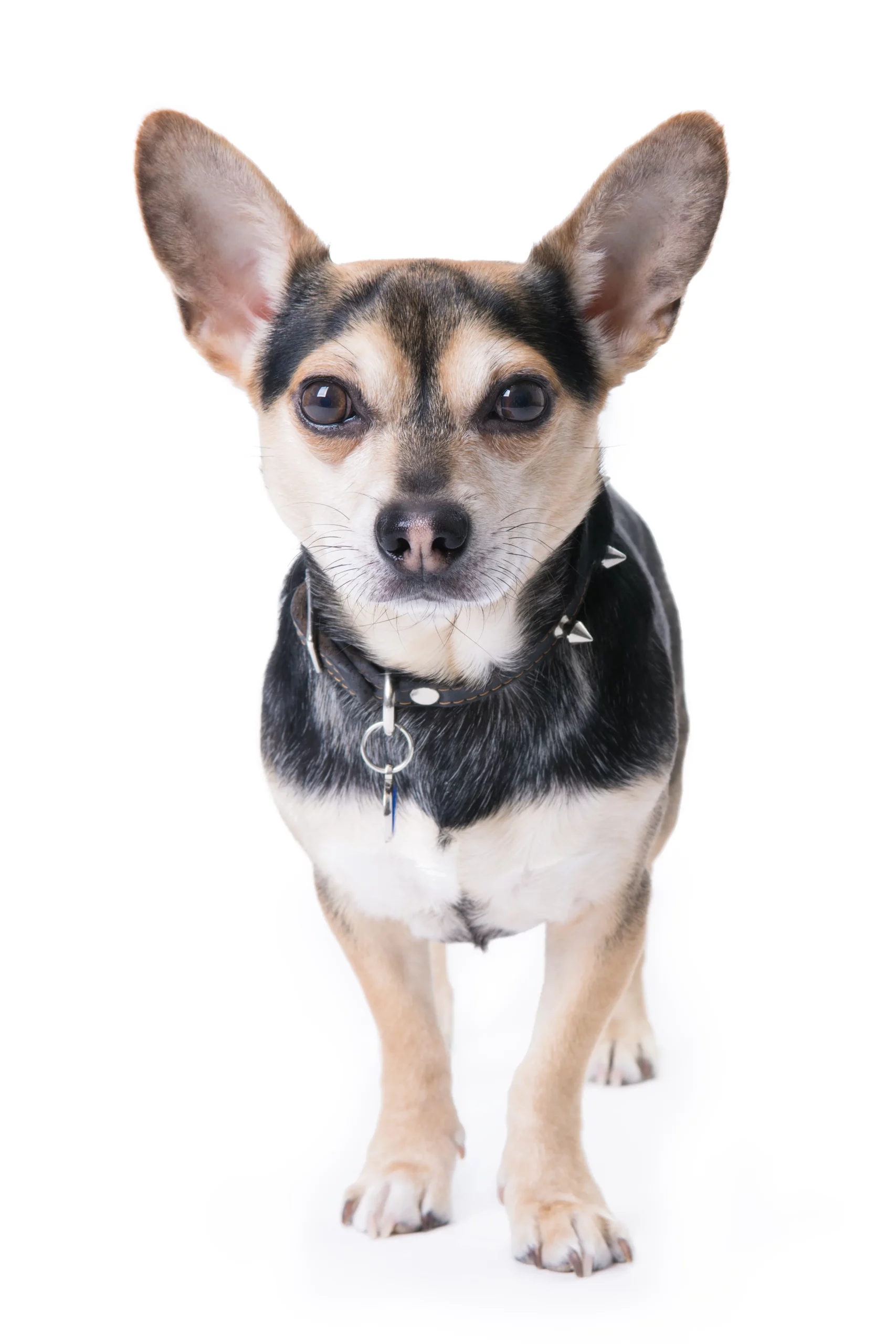
Understanding a Chigi dog’s behavioral traits is crucial for creating a supportive environment that meets their emotional and physical needs. Owners should learn to handle their strong prey drive and socialize enough to avoid aggression. It’s important to tailor training to their needs and keep them active to prevent anxiety and maintain their health.
Managing a Chigi’s prey drive means regular training to turn their hunting instinct into okay behaviors. Socializing them well means exposing them to different people, animals, and places so they can adapt and not react out of fear. Chigis are smart but can be headstrong, so training might be challenging and requires patience and positive methods. They need a lot of exercise daily to stay sharp and not act out.
Behavioral Management
Practical training is essential to keep a Chigi’s hunting instincts in check. Consistent efforts are needed to teach them what’s acceptable. To help them adapt and reduce fear, introduce them to various environments and living creatures. It’s important to remember that Chigis can be intelligent yet stubborn, so stick to training that uses positive reinforcement. They should get enough physical activity daily to keep their minds sharp and prevent unwanted behavior.
Exercise and Activity Needs
Chigis don’t need intense exercise but should stay active daily. This helps them stay mentally fit and avoids any issues from boredom.
Prey Drive Management
Training a dog to manage its prey drive requires practical training strategies. It’s about teaching the dog to channel its instincts safely and suitably for home life.
Owners of Chigi dogs, a cross between Chihuahuas and Corgis, should understand the importance of early socialization in controlling their dog’s prey drive. Using rewards like treats and praise during training can help redirect a Chigi’s desire to chase into more appropriate activities.
Introducing a Chigi to small animals in a controlled way is vital to teaching them how to behave around potential prey. Alongside regular training, this exposure can help the dog become less reactive.
For Chigis with a solid prey drive, a tailored training program from a professional might be needed. This can prevent difficult situations and help maintain a peaceful home.
Socialization Techniques
Early on, introducing a Chigi to different places, diverse people, and other pets is critical for teaching them how to behave appropriately. Positive reinforcement, like giving snacks and praise, promotes good behavior in these dogs.
Short and regular playtimes, especially trips to a dog park, are vital for them to get along with other dogs. This is key for Chigis to grow into friendly pets that don’t overreact.
Chigis are intelligent and have lots of energy, so they must keep their minds busy. Mixing training with play keeps them engaged and happy.
Sticking to a consistent training routine and positive experiences with others is the best way to help Chigis become loving and good-natured.
Training Challenges
Practical training of Chigis, who are competent yet independent dogs, can be challenging. These dogs are known for their stubbornness and high energy, so they’re not the easiest for first-time dog owners to train. They need a lot of your time and patience to bring out the best in them.
Although Chigis want to make their owners happy, they can develop bad habits without enough mental and physical activities. They also tend to get anxious when left alone and might become overly protective of their space. Providing a consistent and supportive training environment to prevent these issues is essential.
Overcoming these training obstacles is critical to raising a well-behaved and flexible Chigi.
Exercise Requirements
Chigi dogs need daily exercise, including both play and walking on a leash, to stay healthy and prevent issues like separation anxiety and being overprotective. These dogs have a moderate energy level and do best with a regular schedule that includes one or two daily walks. They also enjoy time in a fenced yard where they can run free. This mix of structured activities meets their natural needs and helps them handle being alone without getting stressed.
For a Chigi, staying active is vital. Regular physical exercise combined with mental challenges keeps them from developing destructive habits. It supports their well-being and leads to a more even-tempered nature. Mental stimulation is as important as physical activity for these dogs. It keeps their minds sharp and provides an outlet for their energy.
Separation Anxiety Solutions
Addressing separation anxiety in Chigi dogs requires establishing a secure environment and progressively increasing alone time to foster independence.
As Chihuahua mixes, these dogs are often prone to separation anxiety, necessitating tailored interventions.
Providing a safe space, such as a well-equipped crate, offers a sanctuary that mitigates stress when left alone.
A structured routine involving predictable departure and arrival cues can stabilize their expectations, reducing anxiety.
It is essential to incrementally extend the periods of absence to acclimatize the Chigi to solitude.
Cognitive enrichment tools, like puzzle feeders, can distract and engage their minds during these intervals.
Persistent cases might demand the involvement of a canine behaviorist to ensure that the Chigi’s needs are met, and their anxiety is effectively managed.
Wellness Considerations of Chihuahua Corgi Mix
When assessing the wellness of a Chigi, comprehensive health screening emerges as a pivotal measure to identify and manage breed-specific conditions preemptively. Understanding their unique nutritional requirements is essential to maintain their metabolic equilibrium and support their energetic lifestyle. A tailored exercise regimen also bolsters their physical health and contributes to their psychological well-being, preventing behavioral issues.
- Comprehensive genetic health screening to detect predispositions to hereditary diseases.
- Balanced diet formulation, taking into account caloric needs and potential food sensitivities.
- They structured physical activity routines to support cardiovascular health and muscle tone.
- Cognitive enrichment through training and interactive play to enhance mental acuity.
Chigi Health Screening Importance
Regular health check-ups are vital for spotting and stopping diseases early in our canine companions. These check-ups are especially crucial for catching issues like elbow dysplasia, which can lead to pain and trouble moving in dogs. By seeing such problems early, dog owners can quickly get their pets the help they need. This can prevent worse problems down the line.
Dog owners must make these health screenings a regular part of their pet care routine. This helps keep their dogs healthy and active for as long as possible.
Nutritional Needs Overview
Proper nutrition is vital for Chigis, a mix of Chihuahua and Corgi breeds. They need a specific diet to stay healthy and full of energy. It’s essential to give them a diet that stabilizes their blood sugar because small dogs like Chigis can get low blood sugar quickly. They should eat regularly to avoid health problems and to keep their energy up.
Chigis might get teeth problems, too, so it’s good to give them food that helps keep their teeth clean. The best diet for a Chigi has lots of high-quality protein, fiber, and fat that match how much they exercise. It’s also important to watch how much they eat so they don’t get overweight, mainly because they are small and might not be very active.
When feeding a Chigi, it’s wise to consult a vet to create a meal plan that suits their needs. This helps prevent weight gain and supports their overall well-being. For example, a Chigi might do well with a diet that includes lean meats, healthy grains, and certain vegetables. Giving them dental chews can help prevent tooth decay. Measuring their food and monitoring their weight regularly is also a good idea.
This way, Chigis can lead a happy, active life without health issues related to poor diet.
Exercise Regimen Benefits
A structured exercise routine can significantly improve a Chigi’s heart health. This is crucial for their overall well-being and can lead to a longer and more active life. Chigis share the advantage of improved cardiovascular health with regular physical activity among dog breeds. A well-thought-out fitness plan helps these dogs maintain strong hearts and good blood flow.
Exercise Benefits for Chigis
Regular exercise is vital to preventing weight-related health problems in Chigis. It keeps them lean and their muscles toned. This proactive step in their care reduces their risk of becoming overweight and developing related diseases. Exercise also strengthens their immune system, providing better protection against illness. It’s a natural way to keep your dog healthy and fight off diseases.
Physical activity doesn’t just benefit a Chigi’s body; it’s also great for their mental health. It helps prevent stress and anxiety that could lead to behavior problems. A happy dog is a well-exercised dog. Exercise routines keep their minds sharp and their spirits high.
Chigi Right Maintenance Essentials
Ensuring the health and happiness of a Chigi involves a holistic view of their care. A robust maintenance plan should include various routines and approaches essential for their physical and mental well-being. Chigi owners must address these care elements to help their pets enjoy a balanced and joyful existence.
- Implement regular grooming routines to keep their coat healthy and reduce shedding.
- Tailor their diet with a focus on caloric consumption that matches their level of exercise.
- Create an exercise regimen that promotes heart health and helps maintain a healthy weight.
- Conduct ongoing health checks to catch and treat any specific health issues early.
Grooming Routines
To keep a Chigi’s coat healthy and looking its best, follow a grooming schedule with weekly brushing and only bathe them when necessary. This helps keep their unique coat, a mix of Corgi and Chihuahua features, in top shape without stripping away the oils that keep it looking shiny.
You might need to adjust your grooming methods depending on whether they have a short or long coat. Regular brushing reduces shedding and spreads the dog’s skin oils for a glossier coat. Bathing a Chigi too often isn’t advised, but a gentle wash can clean them up just fine when they get dirty.
Remember their dental care; it’s vital for their overall health. Brushing a dog’s teeth daily can prevent gum disease and other oral health problems. Keep up with these simple care steps, and your Chigi will look great and stay healthier.
Diet Considerations
Caring for a Chigi’s coat through regular grooming is essential, but their diet is just as crucial for their health and vitality. Chigis should eat a balanced diet for small dog breeds, which helps them stay energetic and supports their immune system.
Since Chigis can easily suffer from low blood sugar, they must have frequent, small meals. This helps keep their blood sugar stable. A diet high in protein is necessary for their nutritional needs, and managing their food portions, coupled with consistent exercise, is critical to avoiding weight gain.
Giving a Chigi too much food or treats can cause obesity, affecting their ability to move quickly, dulling their coat’s shine, and reducing their overall quality of life. Dog owners should keep a close eye on their Chigi’s eating habits and change their diet as their exercise levels or health needs change.
Exercise Requirements
Chigi dogs need a well-planned exercise routine that spans 30 to 60 minutes of daily activity. This is crucial for both their physical health and mental wellness.
As descendants of herding breeds, Chigis are naturally inclined to be active and may show tendencies to herd. Don’t be misled by their compact size; these dogs are far from inactive companions. They do best with plenty of room to roam and play, but they can adapt to apartment living if they exercise enough.
Engaging them with an interactive play that suits their bright and energetic nature is essential to keep their sharp minds busy and avoid behavior issues.
Health Monitoring
Proper exercise for Chigi dogs is crucial for their physical health and overall well-being. This routine paves the way for effective health management, including consistent vet visits and preventive health strategies.
Chigis, a mix of Chihuahuas and Corgis, have unique health needs that must be addressed to prevent issues like patellar luxation, where the kneecap dislocates, and hip dysplasia. These issues require immediate attention and care from a veterinarian.
Apart from musculoskeletal concerns, Chigis are also at risk for lymphoma, a form of cancer. This makes regular health evaluations vital. Proper grooming, coat brushing, ongoing socialization, and behavior checks are part of a well-rounded approach to caring for a Chigi’s health.
This approach emphasizes the need for active and knowledgeable care routines.
Training Strategies
A consistent and positive training routine is vital for tapping into Chigi’s innovative nature and deep-rooted loyalty. Those who have previously cared for dogs will have an advantage in understanding how to train a Chigi.
Using rewards like snacks or their favorite playthings is a great way to encourage these dogs, who thrive on attention and do well with positive reinforcement training.
Starting training and socializing Chigis when they’re young can help avoid issues like separation anxiety or unnecessary barking later on. These dogs learn quickly, and incorporating play into their training can make the process more enjoyable for the dog and owner while promoting good behavior.
Nutritional Guidelines for Puppy and Adult
When planning a diet for your Chigi, focusing on their health and energy needs is vital. These dogs thrive on balanced nutrients that match their active nature and metabolic rates. Measuring meal sizes and feeding times is critical to maintaining a healthy weight and avoiding obesity.
- Calculate the right calories for each meal to keep your Chigi energetic.
- Customize their diet to support both growth and everyday health.
- Schedule meals to aid digestion and keep their metabolism running smoothly.
- Use a weight control strategy to help your Chigi stay in shape.
When feeding your Chigi, remember that quality is as important as quantity. Choose high-quality ingredients that provide a range of nutrients. This will help your dog stay fit and happy.
Chigi Shedding and Diet Essentials
A Chigi’s diet must be well-rounded to support their health and active lifestyle. High-quality proteins, fats, carbs, and essential vitamins and minerals are crucial. The unique needs of a Chigi come from their crossbreed nature, with a usual weight range of 15-30 pounds. Their diet should help keep their energy up and address common health issues like patellar luxation and hip dysplasia.
A Chigi’s meal plan should have lean proteins to support muscle health, omega-3 fatty acids for a shiny coat, and fiber-rich carbs for a healthy gut. The owner is responsible for feeding them a diet that strengthens their joints and fits their playful and loving nature. Regular vet visits are vital in ensuring their diet meets their changing needs.
Feeding Frequency Tips
When planning your Chigi’s diet, it’s crucial to focus on the quality of nutrients and how often they’re fed for optimal health. Small to medium-sized breeds like Chigis thrive on a regular eating schedule.
Two to three meals daily are ideal, spaced out from morning to evening, to keep them lively and well.
Every Chigi has different needs based on their activity level and weight goals. Observing their body condition and adjusting meal times help prevent overeating and underfeeding.
It’s wise to consult a vet for the best feeding routine and appropriate meal sizes for your dog’s nutritional requirements.
Managing Weight Healthily
You need a well-balanced diet and regular exercise that suits your needs to keep your Chigi healthy weight. Each Chigi’s plan should be personalized, considering their energy use and metabolism.
A good diet for these dogs involves controlled portions and scheduled meals to prevent them from eating too many calories and gaining weight. Their meals should be made of high-quality foods rich in nutrients, and treats should be given sparingly to not spoil their diet.
Exercise is also essential, with daily walks and playtime that keep them active and fit. These activities help prevent obesity and keep your Chigi a beautiful part of your family.
It’s also important to talk to a vet to determine the best weight for your Chigi and get advice on the right food and exercise plan.
